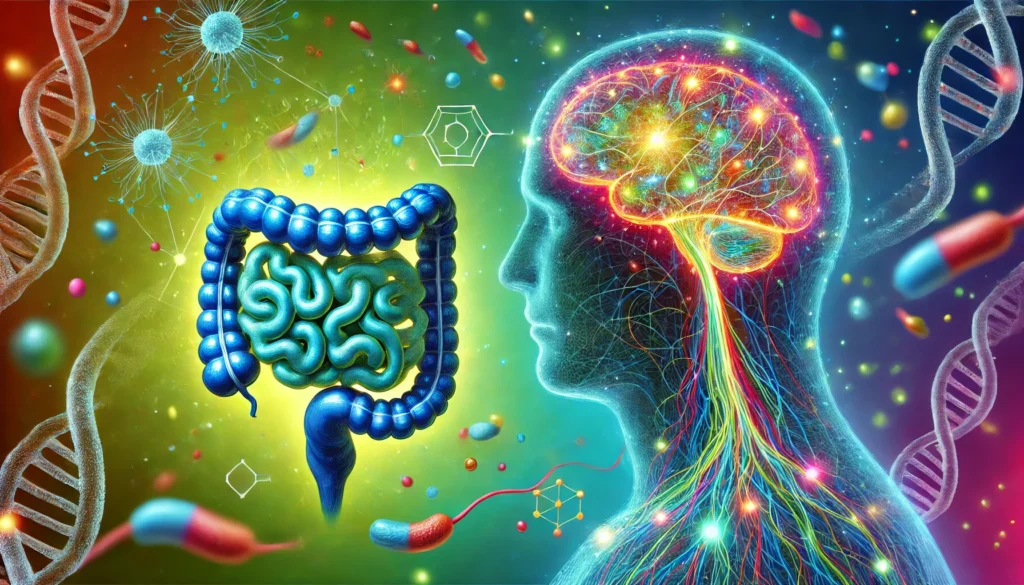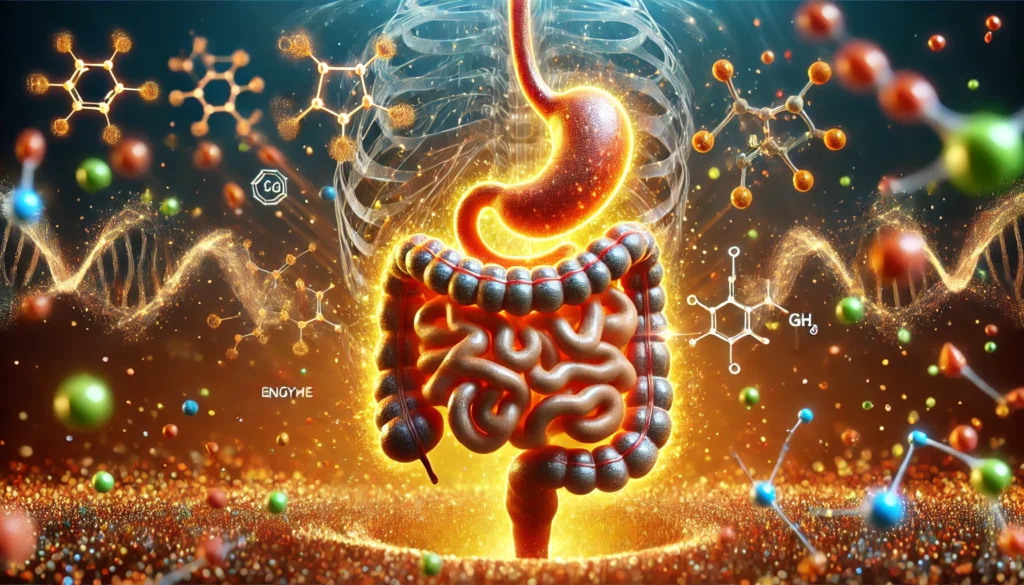Pancreatin is a mixture of digestive enzymes produced by the pancreas and plays a crucial role in the digestion and absorption of nutrients. While primarily known for its use in treating digestive disorders, pancreatin has been increasingly explored for its potential nootropic benefits. Nootropics are supplements or drugs that improve cognitive functions, such as memory, attention, and learning, particularly in healthy individuals. The interest in pancreatin as a nootropic stems from its involvement in the digestive process, which impacts nutrient absorption, metabolism, and energy production—key factors in maintaining optimal brain health and function.
This article provides an in-depth analysis of pancreatin, including its chemistry, physiological mechanisms, potential nootropic benefits, dosage guidelines, side effects, drug interactions, and other critical considerations for safe supplementation.
You May Also Like:
Pancreatin: Potential Nootropic Benefits, Dosage, Side Effects, Interactions, and Other Important Information About This Supplement is an original (NootropicsPlanet) article.
Sources of Pancreatin
Pancreatin is derived from the pancreas of animals, most commonly pigs and cows, for use in supplements. It contains a blend of enzymes, including amylase, lipase, and protease, which are vital for breaking down carbohydrates, fats, and proteins, respectively. The specific ratios of these enzymes can vary between products, but their collective action helps individuals with pancreatic insufficiency or malabsorption syndromes digest food more effectively.
In supplement form, pancreatin is available in several forms, including capsules, tablets, and enteric-coated pills. The enteric coating is important for ensuring that the enzymes are not destroyed by stomach acid before reaching the small intestine, where they can exert their effects. Pancreatin is commonly found in enzyme supplements, sometimes combined with other digestive aids like bromelain or papain.

Chemistry of Pancreatin
Pancreatin is a complex mixture of enzymes, each with a specific role in the digestion of macronutrients:
- Amylase: Breaks down carbohydrates into simple sugars, facilitating glucose absorption. This process is critical for energy production in the brain, as glucose is its primary energy source.
- Protease: Degrades proteins into smaller peptides and amino acids, which are essential for neurotransmitter synthesis. Amino acids like tryptophan and tyrosine are precursors to serotonin and dopamine, key neurotransmitters involved in mood regulation and cognitive function.
- Lipase: Catalyzes the breakdown of dietary fats into fatty acids and glycerol, which are crucial for the synthesis of myelin (the protective sheath around neurons) and other cellular membranes in the brain.
The balance of these enzymes is critical for maintaining a healthy digestive system, but they may also indirectly impact brain function by optimizing nutrient absorption and energy production.
Physiological Mechanisms of Pancreatin in the Body and Brain
Pancreatin’s primary function is to assist in the digestive process, enabling the body to efficiently extract nutrients from food. Proper digestion and absorption of nutrients are fundamental to overall health, particularly brain health. The brain requires a constant supply of glucose, amino acids, and fatty acids to function optimally. By improving digestion, pancreatin ensures that these nutrients are available in sufficient quantities to support cognitive function.
Moreover, pancreatin may have indirect effects on brain health through its role in reducing gastrointestinal inflammation and improving gut health. Emerging research has shown a strong connection between the gut and brain, often referred to as the “gut-brain axis.” Inflammation in the gut can lead to systemic inflammation, which has been implicated in neurodegenerative diseases like Alzheimer’s and Parkinson’s. By improving gut health, pancreatin may reduce inflammation and oxidative stress, both of which are detrimental to cognitive function.

Nootropic Benefits of Pancreatin
The nootropic potential of pancreatin is largely speculative and not as well-documented as other nootropic compounds like caffeine, ginkgo biloba, or racetams. However, based on its role in nutrient absorption and energy metabolism, pancreatin may offer several indirect cognitive benefits:
- Improved Nutrient Absorption: By enhancing the digestion of proteins, fats, and carbohydrates, pancreatin ensures that the brain has a steady supply of essential nutrients. These include amino acids for neurotransmitter synthesis, fatty acids for cell membrane integrity, and glucose for energy production—all critical components for maintaining cognitive function.
- Enhanced Brain Energy Metabolism: The brain is an energy-intensive organ, consuming approximately 20% of the body’s energy at rest. Pancreatin’s role in carbohydrate digestion ensures that the brain receives a continuous supply of glucose, the primary energy source for neurons. This may support better focus, memory, and mental clarity, especially in individuals experiencing mental fatigue.
- Gut-Brain Axis and Cognitive Health: As previously mentioned, the gut-brain axis is a significant area of interest in neuroscience. By improving gut health and reducing inflammation, pancreatin may have a neuroprotective effect, potentially delaying the onset of age-related cognitive decline or reducing symptoms of conditions like anxiety and depression, which are often linked to poor gut health.
- Reduction of Brain Fog: Brain fog, characterized by forgetfulness, confusion, and a lack of mental clarity, is often linked to poor digestion and nutrient absorption. Individuals with conditions like irritable bowel syndrome (IBS) or celiac disease often report cognitive symptoms alongside their digestive issues. By improving digestion, pancreatin may alleviate these symptoms, leading to clearer thinking and better cognitive performance.

Dosage and Supplementation Guidelines
The appropriate dosage of pancreatin depends on the specific enzyme activity of the product, which is typically measured in USP units. A typical pancreatin supplement contains around:
- 25,000–100,000 USP units of protease
- 12,000–60,000 USP units of amylase
- 2,500–10,000 USP units of lipase
For general digestive support, pancreatin is usually taken with meals, and the dosage can vary depending on the individual’s needs. Higher doses are often recommended for individuals with pancreatic insufficiency, while lower doses may suffice for general digestive aid.
For potential nootropic benefits, there is no established dosage as research in this area is still preliminary. However, given pancreatin’s role in optimizing nutrient absorption, individuals interested in its nootropic effects may consider taking it alongside nutrient-dense meals to ensure maximum nutrient bioavailability.
Side Effects and Safety
Pancreatin is generally considered safe when used as directed. However, some individuals may experience mild side effects, particularly when starting supplementation or taking higher doses. These side effects may include:
- Digestive Upset: Common side effects include nausea, diarrhea, or abdominal cramping. These symptoms are usually mild and resolve as the body adjusts to the supplement.
- Allergic Reactions: In rare cases, individuals may experience allergic reactions to animal-derived pancreatin supplements. Symptoms may include rashes, itching, or difficulty breathing. Individuals with known allergies to pork or beef should avoid animal-derived pancreatin and consult their healthcare provider for alternative options.
- Mouth Irritation: In some cases, pancreatin can cause irritation of the mucous membranes, particularly if tablets or capsules are chewed or broken open.

Interactions with Other Supplements and Medications
Pancreatin can interact with other supplements and medications, potentially affecting their absorption or efficacy. Some notable interactions include:
- Antacids: Taking antacids alongside pancreatin may reduce its effectiveness by neutralizing stomach acid, which is necessary for activating pancreatic enzymes.
- Iron Supplements: Pancreatin may interfere with the absorption of iron, leading to lower serum iron levels. Individuals taking iron supplements should consult their healthcare provider before adding pancreatin to their regimen.
- Blood Thinners: Protease enzymes, such as those found in pancreatin, may have mild blood-thinning effects. While this is not typically a concern at standard dosages, individuals taking anticoagulants like warfarin should use pancreatin with caution and under medical supervision.
- Fiber Supplements: High-fiber diets or fiber supplements can reduce the effectiveness of pancreatin by binding to enzymes and preventing them from reaching the small intestine.
Risks for Individuals with Certain Health Conditions
While pancreatin is generally safe for most individuals, certain health conditions may warrant caution:
- Cystic Fibrosis: Individuals with cystic fibrosis often require higher doses of pancreatin to aid in digestion. However, excessive dosing can lead to the formation of fibrosing colonopathy, a rare but serious condition that affects the intestines.
- Gastrointestinal Disorders: Individuals with pre-existing gastrointestinal conditions, such as Crohn’s disease or ulcerative colitis, should consult their healthcare provider before using pancreatin, as it may exacerbate symptoms in some cases.
- Pregnancy and Breastfeeding: There is limited research on the safety of pancreatin during pregnancy or breastfeeding. While it is generally considered safe, individuals in these groups should consult their healthcare provider before using pancreatin supplements.
Conclusion:
Should You Consider Pancreatin as a Nootropic?
While pancreatin’s primary use is in the treatment of digestive disorders, its role in enhancing nutrient absorption and metabolism suggests that it may offer indirect cognitive benefits. By supporting the digestive process, pancreatin ensures that the brain receives the nutrients it needs to function optimally, which may improve mental clarity, focus, and energy levels.
However, it is important to note that the evidence supporting pancreatin as a nootropic is still in its early stages. While it may be beneficial for individuals with digestive issues, its cognitive-enhancing effects are largely speculative. As with any supplement, individuals considering pancreatin for its nootropic potential should consult a healthcare provider to ensure it is appropriate for their specific needs.
In summary, pancreatin is a versatile digestive enzyme supplement that may offer indirect support for brain health through its role in nutrient absorption and gut health. While it is not a traditional nootropic, its ability to optimize digestion may contribute to better cognitive performance, particularly in individuals with nutrient malabsorption or digestive issues.

References:
- Pancreatin: Uses, Side Effects, & More. Retrieved from: https://www.verywellhealth.com/pancreatin-4775747
- Pancreatin Tablet – Uses, Side Effects, and More. Retrieved from: https://www.webmd.com/drugs/2/drug-1457/pancreatin-oral/details
- Pancreatic Enzyme Products – Uses, Side Effects, and More. Retrieved from: https://www.webmd.com/vitamins/ai/ingredientmono-254/pancreatic-enzyme-products
- The Positive Effects of Exogenous Pancreatin on Growth Performance, Nutrient Digestion and Absorption, and Intestinal Microbiota in Piglets. Retrieved from: https://pmc.ncbi.nlm.nih.gov/articles/PMC9395744/
Important Note: The information contained in this article is for general informational purposes only, and should not be construed as health or medical advice, nor is it intended to diagnose, prevent, treat, or cure any disease or health condition. Before embarking on any diet, fitness regimen, or program of nutritional supplementation, it is advisable to consult your healthcare professional in order to determine its safety and probable efficacy in terms of your individual state of health.
Regarding Nutritional Supplements Or Other Non-Prescription Health Products: If any nutritional supplements or other non-prescription health products are mentioned in the foregoing article, any claims or statements made about them have not been evaluated by the U.S. Food and Drug Administration, and such nutritional supplements or other health products are not intended to diagnose, treat, cure, or prevent any disease.


